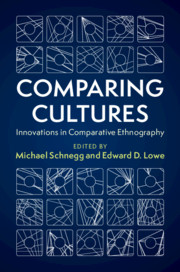Book contents
- Comparing Cultures
- Comparing Cultures
- Copyright page
- Contents
- Figures
- Tables
- Contributors
- Introduction
- Part I Binary Comparisons
- Part II Regional Comparisons
- 4 The Comparison of Structures and the Comparison of Systems
- 5 Regional Comparison in Historical Anthropology
- 6 Scaling Ethnography Up
- Part III Distant and Fluid Comparisons
- Index
- References
4 - The Comparison of Structures and the Comparison of Systems
Lévi-Strauss, Dumont, Luhmann
from Part II - Regional Comparisons
Published online by Cambridge University Press: 08 May 2020
- Comparing Cultures
- Comparing Cultures
- Copyright page
- Contents
- Figures
- Tables
- Contributors
- Introduction
- Part I Binary Comparisons
- Part II Regional Comparisons
- 4 The Comparison of Structures and the Comparison of Systems
- 5 Regional Comparison in Historical Anthropology
- 6 Scaling Ethnography Up
- Part III Distant and Fluid Comparisons
- Index
- References
Summary
The notion that comparison is not the search for similarities but the systematization of differences leads to the question of which shared set of concepts and assumptions might be employed to explore this notion. Comparative analysis should at once reduce the complexity of data in the service of comparison and yet still reference the uniqueness and specificity of local values and ideas. Three types of comparison potentially fulfill these criteria. Claude Lévi-Strauss traces the transformations of oppositions and codes across cultural boundaries without claiming to compare societies as such. Louis Dumont contrasts systems of values that represent societies-as-wholes by analyzing their structuring into hierarchical levels. Niklas Luhmann’s theory of autopoietic systems enables the comparison of relationships between social systems and their environments, without assuming societies as units of comparison – examples being the making of ethnic identities and boundaries. A synthesis of the three approaches provides avenues of comparison in a globalized world, as is exemplified by the author’s own work in upland Southeast Asia.
- Type
- Chapter
- Information
- Comparing CulturesInnovations in Comparative Ethnography, pp. 93 - 116Publisher: Cambridge University PressPrint publication year: 2020

